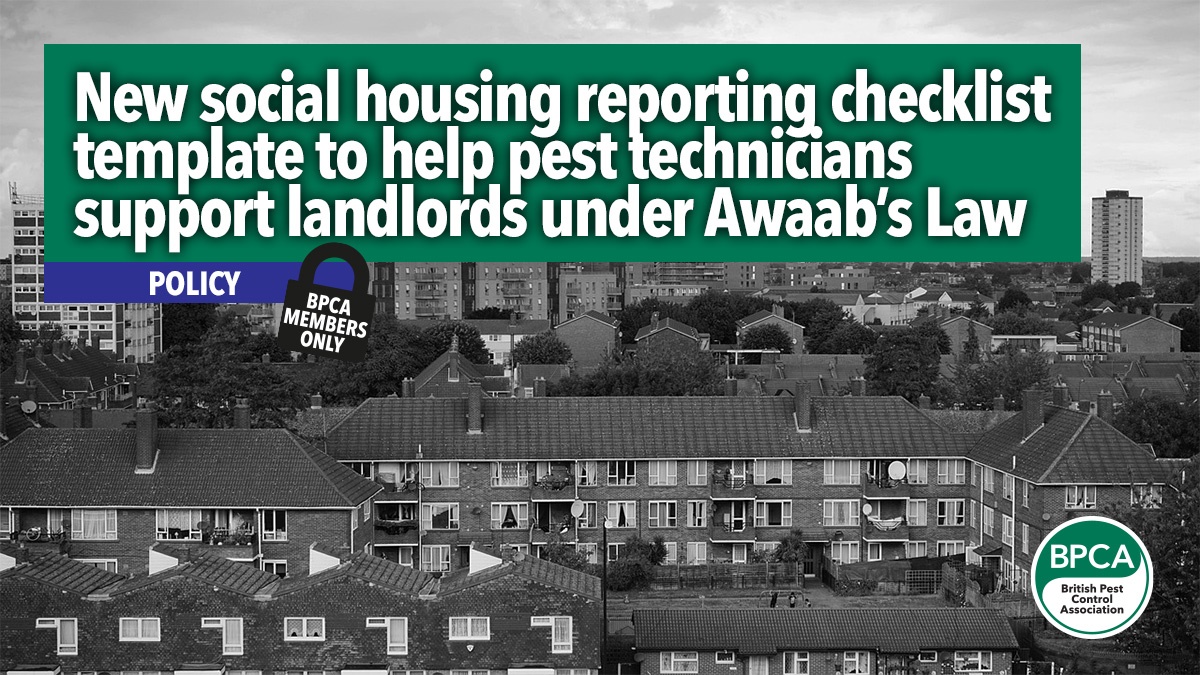LEGISLATION
BPCA members can now access a new Social Housing Reporting Checklist in the BPCA Member Library, designed to make it easier for technicians to record and report potential hazards when working in social housing properties.

The template supports pest management professionals working as contractors for local authorities and housing associations, helping them understand and meet the reporting expectations laid out in Awaab’s Law.
It also gives members a practical tool for responding to the growing number of hazard-reporting requests already coming from social landlords.
Helping members stay ahead of new legal duties
Awaab’s Law introduces strict repair deadlines for social landlords, including a 24-hour deadline for emergency hazards. Crucially, those timers can begin the moment the landlord becomes aware of a problem.
In some contracts, that moment of awareness can occur as soon as a technician sees an issue.
Niall Gallagher, BPCA Technical Manager, said:
“Pest technicians are often the only professionals who routinely enter these homes. This puts them in a unique position to spot issues early, long before a surveyor or housing officer visits.
“The checklist isn’t about turning technicians into building surveyors. It’s about helping them record the obvious hazards that any reasonable person would notice, so landlords can act quickly and stay compliant.”
Although only certain hazards are legally enforceable in the initial phases of Awaab’s Law, BPCA’s checklist includes all Housing Health and Safety Rating System (HHSRS) hazards (with the exception of overcrowding).
This means technicians can report problems now that may not become legally enforceable until 2026 or 2027.
Niall added:
“We’ve deliberately included every hazard to help members stay ahead of the curve and prepare for what’s coming next.
"Members are already being asked for hazard information by social landlords. Some landlords are using their own forms and expect pest control contractors to understand and comment on a wide range of issues, so you could use this document to help explain the legislation to your technicians as a training material.
BPCA’s role in shaping the legislation
BPCA played a key role in ensuring that pest infestations were explicitly included in the second phase of the Awaab’s Law regulations (expected autumn 2026). This means social landlords will have clear duties to investigate and address pest issues as part of their wider legal responsibilities.
Including pests within the framework was important for the industry, as untreated infestations often sit alongside other serious housing hazards like damp, mould, excess cold, and poor hygiene conditions.
What the template does
The format walks technicians through recording:
- Time and date of the visit
- Who they spoke to
- Signs of hazards that would be reasonably obvious to a layperson
- How and when the issue was reported to the landlord.
It also includes optional sections for recording any known vulnerabilities of the resident, such as mobility issues or language needs, where relevant to the hazard being reported.
Importantly, BPCA stresses that technicians do not need to be experts in fire safety, electrics, damp, structural issues, or any other hazard category.
The checklist simply helps them flag anything that looks unsafe or unusual.
Niall said:
“No one expects technicians to diagnose structural defects or electrical faults. They’re not engineers. They’re there to report what they can see, smell, or hear.
“If something looks risky, report it. That’s all the law requires. The landlord will do the investigation.”
Why this matters for your contracts
Members tell us that more social landlords are expecting hazard-reporting as part of routine pest control work, even when infestations aren’t present. Many landlords are also asking contractors to complete paperwork aligned to Awaab’s Law and HHSRS well before the legal deadlines kick in.
Having access to a BPCA-produced checklist means:
- you can demonstrate a consistent, professional approach
- you can protect yourself if you ever need evidence that you reported a hazard promptly
- you can adapt the document to match individual client requirements.
Download the new template
BPCA Members can download and customise the checklist from the BPCA Member Library.
If you have questions about using the document or working under Awaab’s Law, contact the Technical team for advice.
If you’d like help adapting the template to suit specific social landlord contracts, the team can support with that too.
Download the checklist

Source: Online